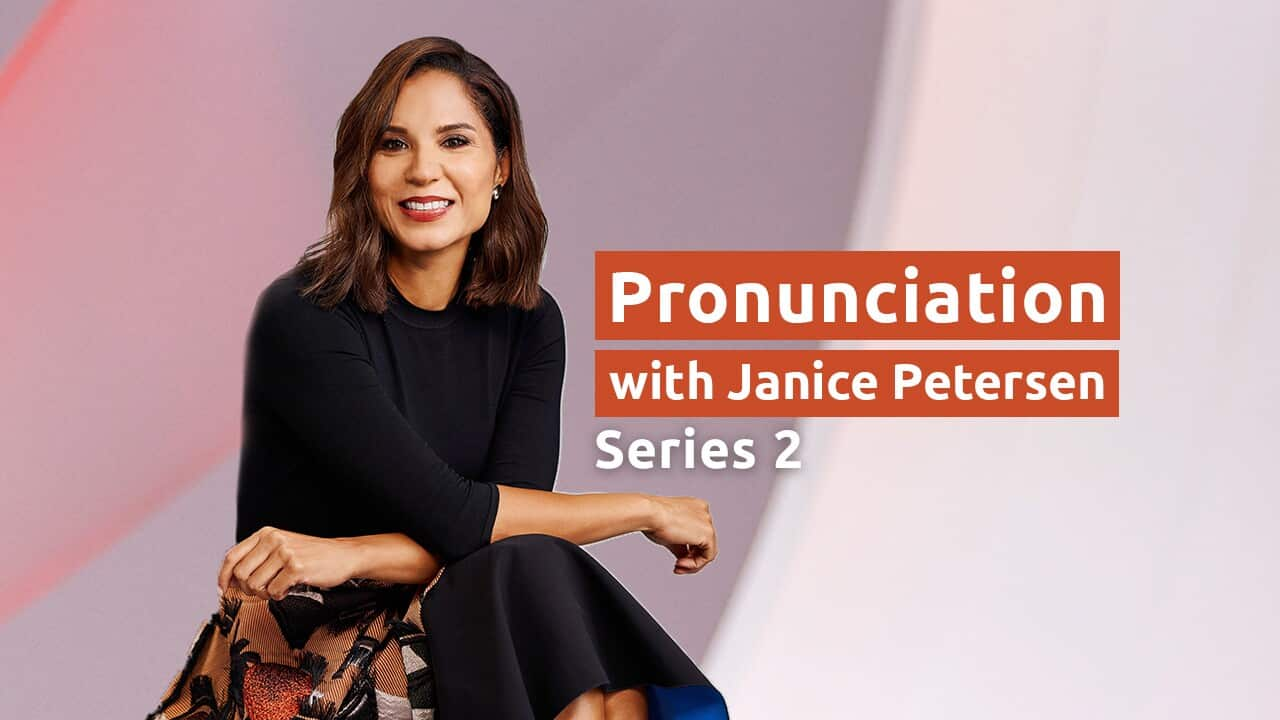English sounds different depending on where you are in the world. Australians, Americans, and British people all speak English in their own special ways. But even in Australia, people can sound different from one another.
What is Australian English?
It is sometimes assumed that Australian’s speak in only one way because of the style of speaking on the TV and radio. This way of speaking is called Standard Australian English. Standard Australian English is most often taught in schools and to people learning English because it is a clear reference point. News presenters, like Janice Peterson - SBS World News, often speak in Standard Australian because it has a speed, pitch, and pace that is easy to understand. Check out with Janice and you’ll hear why!
Listen and learn

Improve your pronunciation | Season 2
Even though Standard Australian English is the most heard way of speaking in Australia, this does not mean it is the ‘best’ or ‘correct’ form of Australian English. Accents and ways of speaking can change depending on region, social class, cultural group, age, and gender. Plus, all accents change over time, so there is no single version of an accent. It’s also important to acknowledge that First Nations Australians have their own and their own languages.
Pronunciation differences around Australia
Unlike some countries where you might hear different dialects in different regions, in Australia, the dialect is broadly the same across the whole country. But, there are some in the way that vowels (a, e, i, o, u, and sometimes y) are pronounced that are noticeable.

Three diverse female friends sat outside of a cafe laughing and talking over a coffee. Credit: SolStock/Getty Images
There are also some differences in pronunciation outside the big cities. For example, in the smaller cities of Adelaide and Hobart the /l/ sound can replace a vowel, changing the pronunciation of words like hurled into hurlld. Likewise, the use of a rising intonation that makes sentences sound like questions, is more obvious in regional areas.
Do Australians speak fast?
If you are new to Australia you might feel as though Australians speak very fast. The average rate of speaking in Australia is about 160 words per minute, ten words faster than in the US, but slower than those from Britain where the average rate is about 198 words per minute. The faster someone talks, the harder they are to understand because the separation between words become less clear and some sounds get linked together. Australians are known for shortening words and joining sounds together.
For example, 'how are you going' becomes 'owarya goin' when speaking quickly.
showed that there are some distinct regional differences in how quickly people speak. In Hobart, you might have to ask people to speak more slowly! They have the fastest rate of speaking at 194 words per minute. On the other end of the scale, the average rate of speech was around 120-130 words per minute for people in Cairns and Adelaide. Maybe it’s the beautiful surroundings and great weather that make people less hurried?!
Are there any differences in vocabulary?
The people use across Australia is sometimes more obvious than differences in the way that people speak.

Bird scavengers food from rubbish bins on Sydney back street. These Australian White Ibis are often referred to as 'Bin Chickens' by locals and are widespread throughout Australia. Source: Moment RF / ImagePatch/Getty Images

Credit: WANDER WOMEN COLLECTIVE/Getty Images
How can I understand Australian accents?
There are many ways that you can embrace these differences in Australian accents, speed of speaking, and vocabulary.
Practise listening carefully: Pay attention to the different ways English is spoken. Next time you’re on holiday or taking a break at the shops, listen to the people around you. Can you hear any differences?
Ask for repetition: If you have difficulty understanding someone, politely ask them to repeat themselves or ask them to speak more slowly. Here are some useful phrases you can use:
- Sorry, could you please say that again?
- Sorry, could you please say that a bit more slowly?
- I didn’t catch that, could you please repeat it?
- Would you mind saying that again more slowly please?
- I missed that, could you say it one more time?
Practise your pronunciation: The more you practise the more you’ll feel confident talking to people from all over Australia. A good place to start is .
Be open minded: Acknowledge and respect the diversity of English accents and ways of speaking. By being curious, you can learn about and appreciate differences in accents without having to memorise every variation.
The richness and variety of language in Australia makes for a more interesting country. By appreciating how people speak differently, we can enjoy the variety of voices that make up our world.
References:
Blair, D., & Collins, P. (Eds.). (2001). English in Australia. John Benjamins Publishing.
Block, S., & Killen, D. (1996). Speech rates of Australian English-speaking children and adults. Australian Journal of Human Communication Disorders, 24(1), 39-44.
Carter, L. (2024). Speech rates in Australia: The cities with the fastest (and slowest) talkers.
Gutoskey, E. (2022). How Many Words Per Minute Does the Average Person Speak?
Cox, F. and Palethorpe, S. (2024). Macquarie University: Regional Accents.








